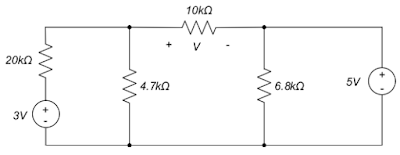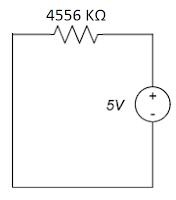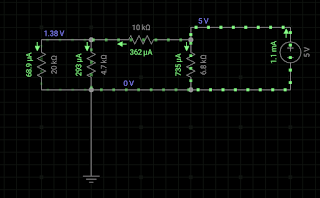Super Position |
Date 9/26/17
Overview
Use circuit reduction techniques in conjunction with superposition to analysis a circuit.
 |
| original circuit |
Pre-Lab
Use superposition to calculate V by analyzing V with respect to the 10k resistor from voltage source of 3 volts from the left, and then from the voltage source on the right of 5 volts, and then adding the sums to calculate V.
Right side
1) short out Voltage Source of 3 volts
2) Simplify parallel resistors of 20k Ω and 4.7kΩ
R = (20k x 4.7k) / (20k + 4.7k)
R = 3805.668016 Ω
3) Simplify series resistors of 3805.7k Ω and 10k Ω
R = 3805.7 Ω + 10k Ω
R = 13,805.7 Ω
4) Simplify parallel resistors
R = (13,805.7 x 6.8k) / (13,805.67 + 6.8k)
5) Find total current
V = IR
V/R = Itotal
5v / 4556 = Itotal
Itotal = 1.0975 x 10^(-3) A = 1.0975 mA
6) Use current divider rule to find current flowing thru 13,805.67k resistors from step 3 figure
I13805.67 = (1.0975 x 10^(-3)) x ((6.8k) / (13,805.67 + 6.8k)
I13805.67 = 3.6217 x 10^(-4) A
I13805.67 = 362 μA
6b) Find V at 10k
V = IR
V = (362 μA)(10k)
V = 3.62 volts
Left Side
7) Short out 5v voltage source from original circuit
 |
8) Transform voltage to current, and simplify parallel resisors 20k Ω & 4.7k Ω
I = V / R
I = 3 / 20k Ω
I = 150 μA
R = (20k x 4.7k) / (20k + 4.7k)
R = 3805.67 KΩ
9) Transform current back to voltage and simplify series resistors
V = IR
V = 150 μA x 3805.67K Ω
R = 10k + 3805.67
R = 13805.67 Ω
10) Find total current
I = V/R
I = .57085 v / 13,805.67 Ω
I = 41.3488 μA
11) Find V at 10k
V = IR
V = (41.3488 μA)(10k)
V = 0.4135 volts
11) Find V at 10k
V = IR
V = (41.3488 μA)(10k)
V = 0.4135 volts
Combine both voltages at 10k
(NOTE: 5v is greater than 3v at 10k resistor so current is flowing west)
V = 3.62v - .4135v
V = 3.2065 volts
Or Combine current from both sides at 10k
(NOTE: 5v is greater than 3v at 10k resistor so current is flowing west)
362 μA - 41.3488 μA = 320.6512 μA
V = (320.6512 μA) x (10k Ω)
V = 3.2065 volts
V = 3.21 volts
Comments :
This lab was tricky to figure out with the short, I realized that I had to keep the short which still had current despite it initially being equal to zero where we were able to then have the resistor next to it also be zero. In the simulation using EveryCircuit, I was able to create a short using a Ammeter which resulted in the same results, with my calculations being more accurate than the app rounding numbers. I also realized that from the left side we could of done mess method which also resulted in the same results where current flows thru the 10k resistor.
It was odd to have very minimal percentage error of less then 1 percent for removing the 3v voltage source or the combined voltages, but then the spike in increase regarding the percentage error with having the 5v voltage source removed. When connecting open circuit to a DMM, the reading was .35 which would of resulted in a greater percentage error.
(NOTE: 5v is greater than 3v at 10k resistor so current is flowing west)
V = 3.62v - .4135v
V = 3.2065 volts
Or Combine current from both sides at 10k
(NOTE: 5v is greater than 3v at 10k resistor so current is flowing west)
362 μA - 41.3488 μA = 320.6512 μA
V = (320.6512 μA) x (10k Ω)
V = 3.2065 volts
V = 3.21 volts
Lab Procedure
1) Build circuit in step 1 of prelab where the 3v voltage source is replaced with a short circuit and record Voltage across 10k resistors. (note: 6.8k, 2.2k and a 1k resistor were used in series to obtain 10k)
2) Build circuit in step 7 of prelab where 5v voltage source is replaced with a short circuit and record voltage across 10k resistors.
3) Build original circuit and record voltage across 10k resistor.
| Calculated | Actual | Percentage error | |
| 3v removed | 3.62 volts | 3.61 volts | % 0.277 |
| 5v removed | 0.4135 volts | 0.37 volts | % 10.8 |
| 3v, 5v remain in circuit | 3.21 volts | 3.22 volts | % 0.311 |
Comments :
This lab was tricky to figure out with the short, I realized that I had to keep the short which still had current despite it initially being equal to zero where we were able to then have the resistor next to it also be zero. In the simulation using EveryCircuit, I was able to create a short using a Ammeter which resulted in the same results, with my calculations being more accurate than the app rounding numbers. I also realized that from the left side we could of done mess method which also resulted in the same results where current flows thru the 10k resistor.
It was odd to have very minimal percentage error of less then 1 percent for removing the 3v voltage source or the combined voltages, but then the spike in increase regarding the percentage error with having the 5v voltage source removed. When connecting open circuit to a DMM, the reading was .35 which would of resulted in a greater percentage error.
 |
| TinkerCadApp |
 |
| EveryCircuitApp |
Super position for left side
Super Position for right side











No comments:
Post a Comment